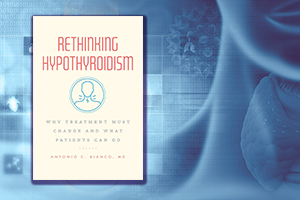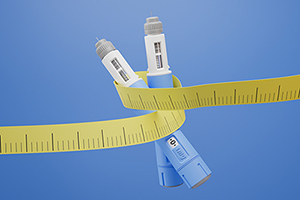



| By Dr. Ronald Hoffman

I just got back from the American Nutrition Association Annual Summit in San Diego. The theme was the impact of nutrition on mental health. It was an awesome assembly of great researchers and speakers, and it’ll provide me with fodder for many Intelligent Medicine articles and podcasts in the new year.
Presenter after presenter laid out the stark fact: It’s undeniable we’re in the midst of a mental health crisis. In addition to diagnosable psychiatric conditions, we’re increasingly angry and impulsive, as is reflected in crime stats, our political discourse, and raucous social media.
Drugs and psychotherapy have not been conspicuously successful at stemming the tide of mental disorders; complete resolution of psychiatric conditions with standard care is more the exception than the rule.
Much of this is fueled by societal factors, but it’s arguable that poor diets play a significant role. Ultra-processed foods laden with sugar, refined seed oils, chemical additives and carby snacks bereft of nutrients critical for brain health are all pro-inflammatory. Studies have confirmed that inflammation impairs decision-making and heightens impulsivity.
And, when it comes to food selection and consumption, what does impulsivity lead to? Disordered eating, poor choices and addictive behaviors, further perpetuating a vicious cycle toward progressive mental impairment.
Sophisticated neuro-imaging now confirms that obesity, in and of itself, is associated with brain changes, and given the high percentage of westerners who now meet the criteria for excess weight, small wonder that we’re seeing a plethora of psychiatric disorders as well as accelerated progression to dementia.
Several of the speakers highlighted the role of the microbiome in brain health. The gut-brain axis, as it’s called, is a busy two-way highway: Impulses from the brain—whether benign or harmful—affect digestion. Stress can change the composition of the microbiome, the bacteria in our intestines that “talk” to the brain via chemical messages. Stress can even alter intestinal permeability, promoting “leaky gut” which predisposes to endotoxemia, autoimmunity, and hampered brain function.
Conversely, the GI tract exerts a profound impact on the brain. A new science has emerged around the concept of “psychobiotics”—probiotics that influence mood. Animal studies show that fecal transfers from extroverted animals can make introverted animals—the rodent equivalent of humans with depression or social phobia—into gregarious critters.
For example, a colleague of mine recently had to take a leave of absence from her position due to nagging GI symptoms accompanied by brain fog and debilitating fatigue. A few months later I saw her at a conference and she seemed happy and spry. She was back full-time to her demanding job.
I asked her what her secret was, and she confided that, after many rounds of conventional treatment failed, she grew desperate and flew to a special clinic in England where fecal transfer from healthy, carefully-screened donors is permitted (here its official use is mostly restricted to patients with life-threatening C. difficile infections). After a treatment, her GI problems resolved. But what was most remarkable, she related, was the effect the procedure had on her energy and mood. She joked: “I must’ve received a poop transfer from a really happy person!”
Interesting as that may be as an illustration of the power of the microbiome to influence brain health, it’s not necessary to go to such an extreme to optimize your interior milieu. A regular intake of prebiotic fiber from fresh unprocessed fruits, vegetables, legumes, nuts and seeds, and whole grains can help to repopulate the gut with healthy species of bacteria; fermented foods like unpasteurized yogurt or kefir, kimchi, pickles, sauerkraut or kombucha can reintroduce species conducive to brain health.
It’s thought that the way intestinal bacteria exert their effects on brain health is via their regulatory effect on inflammation, production of short-chain fatty acids like butyrate which act as brain-fuel, and synthesis of “feel-good” neurotransmitters like serotonin.
Misguided government policies contribute to the mental health epidemic. Among food subsidies 64% are for grains, like wheat and corn, which make their way into cheap processed foods or are used to fatten livestock; 0.045% are for fruits and vegetables.
Intake of soybean oil has increased one thousand-fold since 1909. Refined polyunsaturated seed oils are profoundly pro-inflammatory because they increase arachidonic acid, a precursor to harmful cytokines.
Labels are complex and misleading. The average shopper puts 20+ items in their shopping cart. Imagine peering at a label on each package for the 5-6 minutes it would require to properly decipher it, that is if you even had the nutrition literacy to comprehend the confusing breakdowns. A quick food run could turn into an hours-long ordeal.
The human body and brain have not had time to evolve to cope with the massive changes in diet we’ve subjected them to in a mere century, after millions of years of gradual adaptation to ancestral food sources. This argues for a return to traditional eating patterns with avoidance of industrially-processed fare.
Studies reveal that individuals with a healthier diet have about a 30-35% reduced risk of depression. And statistical analysis reveals it’s not just reverse causality (differences in socioeconomic pressures, exercise, or other lifestyle factors), nor can these robust benefits be attributed merely to avoidance of obesity. Even stressed, poor or unemployed, less-educated, sedentary or overweight persons who eat better enjoy better mental health than their comparable peers.
So, is there any evidence that diet change can alleviate mental conditions in human psychiatric patients? The aptly-named 2017 SMILES study offers resounding confirmation of that hypothesis. In this trial, 67 adults with moderate to severe depression were divided into two groups: one got nutritional counseling for just 12 weeks; the control group was offered social support sessions of identical duration with no diet change.
There was a very large effect size: 30% had full remission with diet, and all participants improved to some degree. You might argue that their “clean” diet is out of reach for most people who can’t afford pricey gourmet health food. But, no, their basic Mediterranean diet consisting of fish, legumes, whole grains, olive oil, frozen fruits and vegetables, was cheaper than the baseline diet it replaced.
Moreover—and this is important when you study interventions for any disease—there was a dose-response effect, i.e., the greater the degree of compliance with the clean diet, the more dramatic were subjects’ improvements. The NNT—the number of patients that need to be treated in order to achieve the therapeutic target was just 4.1 in SMILES trial, meaning that for every four patients who undertook this short-term dietary intervention, one achieved complete resolution of their depression. Compared to trials of even the most promising drugs for depression—who rarely achieve a durable NNT as low as 10—this is astounding! And, this without the side effects or costs of prescription drugs—a truly cost-effective intervention that could save billions of dollars in health care costs as well as lost productivity from, as it turns out, the #1 cause of disability: mental disorders.
In the coming months on Intelligent Medicine, you’ll be hearing more from luminaries on the impact of food and targeted supplementation on mood—I’ve got some fantastic guests lined up.
Meanwhile, for the many nutrition health professionals I’m so appreciative to count among my Intelligent Medicine audience, there’s a pressing need to get the word out about the huge potential for diet and specific nutrients to address our current mental health crisis. I predict a revolution in psychiatry when we take up the banner of lifestyle to improve outcomes in our patients.
Additionally, I can think of no more welcoming gathering-point for the new paradigm than the American Nutrition Association, an organization that can give you essential science-based tools to stem the tide of debilitating diseases via the power of nutrition. Find out about their course offerings here, and make sure to attend to attend their Annual Summit next October in Charlotte, North Carolina.
Though we think of declining estrogen as the hallmark of menopause, it's actually common for…

Up to 12 percent of Americans have ulcers at some point in life. Peptic ulcers…
Gallbladder disease is a modern illness. An estimated 20 million Americans have gallbladder disease. The…

Dr. Antonio Bianco, recipient of the American Thyroid Association’s John B. Stanbury Thyroid Pathophysiology Medal,…

There’s a misconception among low-carb dieters. Many people believe a low-carb diet is much higher…

New, more powerful weight loss drugs: Drugs like Wegovy, Rybelsus, Ozempic and Mounjaro/Zepbound are revolutionizing…

Leyla Weighs In: Eating for Energy and Emotional Well-Being

Our virtual voicemail is open 24/7, so there's no need to wait to submit your questions for Dr. Hoffman. Leave a message, and you may hear your question featured on the Intelligent Medicine radio program!